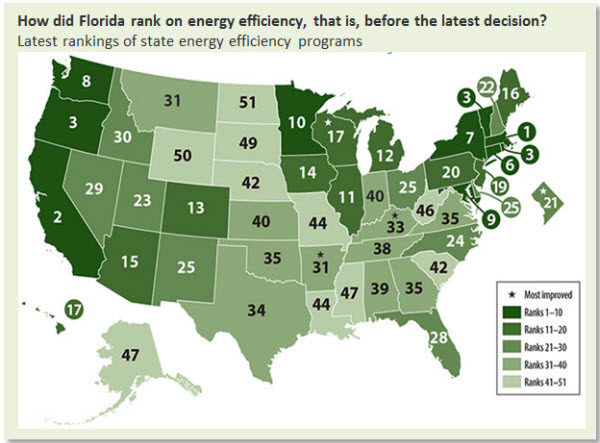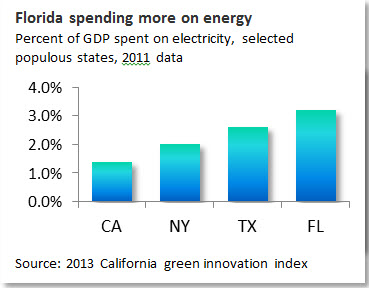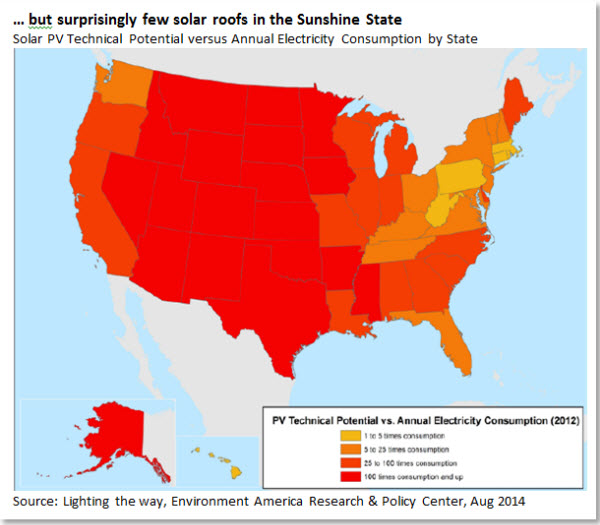Regulators succumb to utility pressure; customers lose – and lose faith in regulators.
This is a sample article from the January 2015 issue of EEnergy Informer.
In a stunning decision in late November 2014, regulators at the Florida’s Public Service Commission (FPSC) voted 3 to 2 to cut the energy efficiency goals of the state’s utility companies by more than 90% and to do away with a solar rebate program in a state that ranks 3rd in the US in solar PV potential. The decision was greeted by a mixture of disbelief and dismay by the environmental and solar community who correctly characterized it as a major setback for Florida consumers.

The only ones celebrating were officials at the state’s major power companies, Duke Energy Florida, Tampa Electric, and Florida Power & Light (FP&L) — all clearly intent to maintain their monopoly franchise businesses by investing more in generation infrastructure and by selling more kWhrs, as they always have.
Referring to the FPSC’s ruling, the Southern Alliance for Clean Energy (SACE), an advocacy group that’s been pushing for solar-friendly policies in Florida, said, “Instead of siding with customers, the PSC sided with monopoly utilities,” adding, “The line between the PSC and the monopoly utilities they are charged with regulating has become increasingly blurred.”

Others had harsher words for the states’ regulators including two politicians who have proposed to reform the FPSC.
Talking to the press, Stephen Smith, executive director of SACE said, “Nobody’s holding these guys (the commissioners) accountable,” adding, “We have had a breakdown in regulatory oversight, and it’s basically because of the money Duke and FP&L are pouring into Tallahassee (Florida state Capital). They’re corrupting the process. And because they’re corrupting the process, customers lose.”

Florida has no renewable portfolio standard (RPS) — which has been adopted by 29 other states — and currently only allows regulated utilities to sell power to customers — which means solar leasing is illegal. These restrictions plus the lack of any support scheme for customer solar generation means that sunny Florida ranked 18th in the US installed solar power capacity in 2013 while it is ranked 3rd in the nation for solar potential, according to Solar Energy Industries Association (SEIA), a pro-solar trade group. That speaks volumes.

As reported on 25 Nov 2014 in Tampa Bay Times, the regulators’ decision to terminate the state’s solar rebate program by the end of 2015 gave the 3 large investor-owned utilities (IOUs) “virtually everything they wanted.” No need to encourage energy efficiency and no need to worry about competition from solar rooftop PVs. According to the paper, the utilities could now focus on building more power plants and sell more kWhrs to the detriment of the consumers and the environment.
The utilities lobbied hard to cut the energy efficiency budget and, even more vehemently to end of the solar rebate programs by claiming that neither was cost-effective.
Using an argument that has consistently proven wrong ever since the energy efficiency guru Amory Lovins coined the term negawatts over 3 decades ago, the IOUs insist that it is cheaper for them to produce a kilowatt of electricity than to save it. In other words, megawatts, they claim, are cheaper than negawatts. Lovins should surely take them up on the challenge, and prove them wrong, as he has succeeded in doing.
Whether negawatts are cheaper than megawatts or not, Florida’s latest ruling seems totally inconsistent with what other states are doing. Tampa Bay Times, for example, reported that the state of Vermont meets 2.12% of its annual energy needs by saving electricity rather than producing it. The corresponding number for Florida is a measly 0.25% — which will drop even further as a result of the FPSC controversial decision.
As Smith sees it, the Commission’s decision was “completely inconsistent” with how other states are dealing with energy efficiency and solar programs,” adding, “It’s a very sad day for the state of Florida.”
The Commissioners, it seems, inadvertently went overboard, not realizing the fury that would follow their decision. Two legislators, John Legg and Chris Sprowls, have already introduced a bill to reform the Commission. They said voters in Florida have lost faith in the PSC and changes are needed to restore it. Stay tuned.

